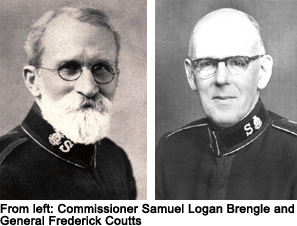 Holiness—which is it, crisis or process? Who is more right, Brengle or Coutts (read Understanding the Difference)? Which interpretation will guide the thinking and practice of The Salvation Army and other Wesleyan Holiness faith communities in the future? Is holiness a matter of purity or maturity? We need to be guided by more than the advice of that dubious theologian, Yogi Berra, who said: “When you come to a fork in the road, take it!”
Holiness—which is it, crisis or process? Who is more right, Brengle or Coutts (read Understanding the Difference)? Which interpretation will guide the thinking and practice of The Salvation Army and other Wesleyan Holiness faith communities in the future? Is holiness a matter of purity or maturity? We need to be guided by more than the advice of that dubious theologian, Yogi Berra, who said: “When you come to a fork in the road, take it!”
The central criticism of Brengle's position is that there are saints who do not testify to experiencing holiness as a crisis experience. And there are those who do testify to a crisis experience, but not a lasting one. There are others, and I am one of them, who give witness to more than one encounter experience in holiness, and not necessarily always a crisis. On the other hand, the criticism of Coutts holiness, one I believe unfair, is that it ignores the possibility of a Damascus Road or Pentecost experience for every believer.
The portrayals and criticisms of Brengle's and Coutts's positions are often more extreme than warranted. There may be those among us who “out-Brengle Brengle”' and “out-Coutts Coutts” by expressing their positions in the extreme and ignoring that there is an appreciation in Brengle's writings for process and in Coutts's writings for crisis.
Crisis and Process
In The Call to Holiness, Coutts very clearly espouses both perspectives. He writes: “The question is sometimes debated whether the experience of holiness is gained instantly or gradually. The answer is that the life of holiness is both a crisis and a process.… They are two sides of a coin. You cannot have one without the other.”
 He goes on to describe a developmental structure of the ongoing holiness experience: “First, there must be a beginning. There arises an awareness of personal need, which draws a man in to an act of full surrender. The forgiven soul awakes to the truth that forgiveness is not enough ... the life that is wholly forgiven must be wholly possessed. And to be fully possessed requires a full surrender.… I am bringing empty hands. I am bringing an empty life. God's answer is to grant me of his Spirit according to my capacity to receive. But the capacity grows with receiving.… A full surrender is the beginning of the life of holy living; the end of the experience I do not—I cannot see. The experience can neither be explained nor lived without crisis and process.”
He goes on to describe a developmental structure of the ongoing holiness experience: “First, there must be a beginning. There arises an awareness of personal need, which draws a man in to an act of full surrender. The forgiven soul awakes to the truth that forgiveness is not enough ... the life that is wholly forgiven must be wholly possessed. And to be fully possessed requires a full surrender.… I am bringing empty hands. I am bringing an empty life. God's answer is to grant me of his Spirit according to my capacity to receive. But the capacity grows with receiving.… A full surrender is the beginning of the life of holy living; the end of the experience I do not—I cannot see. The experience can neither be explained nor lived without crisis and process.”
In many ways, Coutts's remarks parallel John Wesley's position at the end of his life, where he speaks more about the process of growing in grace and holiness than he did in earlier years. They also remind us of a story told by E. Stanley Jones in his book The Word Become Flesh, in which he comments on “pitcher plants” in South America. They have no root systems, yet when it rains they face upward to fill up with water. The more rain they encounter, the more they grow. In the ecology of the rain forest, the rain comes down and fills the plants, and they continue to grow according to God's divine design.
These jungle plants represent a wonderful ecological and developmental metaphor for our understanding of holiness as we seek to find some resolution between Brengle and Coutts regarding crisis and process, purity and maturity.
The Ecology of Holiness
The word “in”—as used in the New Testament phrase “growing in grace”—teaches us that there is an ecology of grace and holiness.
Ecology is that branch of science that deals with the relationships between organisms and their environment. We have come to learn that every living thing is immersed in a context of environment that has specific characteristics. Our first thoughts about ecology may be of a tadpole in a pristine stream enriched by nutrients and free of toxins—an ideal environment for growth, survival and reproduction.
Just as there are biological ecologies, there are social-spiritual ecologies. It is not uncommon for us to be in and out of several ecologies in one day. For example: home, marriage, work, the supermarket, church, a Bible study and a local community meeting. Such ecologies are full of opportunities for growth and development—socially, physically and spiritually.
However, ecologies can also be toxic. When I was 20 years old, I served on a freighter on the Great Lakes. One evening, our ship docked on the Cuyahoga River, which in 1969 was a cesspool of industrial waste. It was so polluted that when a seaman from another ship threw a lit cigarette into the water, the river caught fire. Today it has been cleaned up. Gone are the toxins in a marvellous example of ecological restoration.
When the Apostle Paul refers to “growing in grace,” he is speaking ecologically. He means for us to mature as we immerse ourselves in the appropriate, nutrient-enriched environment of God's grace—in his presence and in our relationships with him and others.
 Jonathan Raymond is the President of Trinity Western University. A cross-cultural social psychologist, he earned his BA in Psychology from Asbury College and his MA in Social Psychology (1972) and PhD in Cross-Cultural Psychology (1975) both from the University of Kentucky. Dr. Raymond served as President and Vice Chancellor at The Salvation Army's Booth College (1999-2006) in Winnipeg, Manitoba. Dr. Raymond and his wife, Irene, have two children. Click here to read other columns in this Social Holiness series.
Jonathan Raymond is the President of Trinity Western University. A cross-cultural social psychologist, he earned his BA in Psychology from Asbury College and his MA in Social Psychology (1972) and PhD in Cross-Cultural Psychology (1975) both from the University of Kentucky. Dr. Raymond served as President and Vice Chancellor at The Salvation Army's Booth College (1999-2006) in Winnipeg, Manitoba. Dr. Raymond and his wife, Irene, have two children. Click here to read other columns in this Social Holiness series.









There's a lot of good stuff in this entry, but what stuck me most is the last thing stated: "When the Apostle Paul refers to “growing in grace,” he is speaking ecologically. He means for us to mature as we immerse ourselves in the appropriate, nutrient-enriched environment of God’s grace—in his presence and in our relationships with him and others." I live with two Christian roommates. I work in a "Christian" environment. I spend many hours at Church during any given week. And yet I find that even with all of these things, sometimes these environments can be more damning and harmful than being constantly amongst non-believers. Sometimes Christians feel they have to surround themselves constantly with other Christians in order to grow. And I'm not saying discipleship isn't important. But isn't it an interesting thought to think that perhaps the "nutrient-enriched environment of God's grace" would be the battlefield--out in the highways and biways where people are so desperate to hear the news that someone loves them, and that they're not huge screw ups. Or even to go into the so-called Christian workplaces and home environments with the mindset that we all have hurts and hangups, and perhaps the people we need to show the most grace to are the ones who we think have got their spiritual walk together. I don't know...an awfully long rant that no one may read, but I felt compelled to write it.
Cheers.